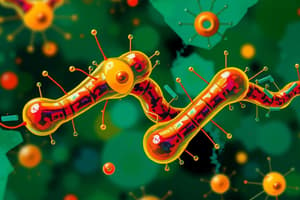Podcast
Questions and Answers
What is the primary cause of hyperglycemia in diabetes mellitus?
What is the primary cause of hyperglycemia in diabetes mellitus?
- Inadequate insulin secretion
- Defective insulin action
- Selective destruction of pancreatic beta cells
- Both defective insulin action and inadequate insulin secretion (correct)
What is the typical age range for the peak presentation of type 1 diabetes mellitus?
What is the typical age range for the peak presentation of type 1 diabetes mellitus?
- 5-8 years
- 18-20 years
- 15-17 years
- 11-13 years (correct)
What is the result of osmotic diuresis caused by the presence of glucose in urine in the kidneys?
What is the result of osmotic diuresis caused by the presence of glucose in urine in the kidneys?
- Weight loss
- Blurred vision
- Polyuria (correct)
- Polydipsia
What is the consequence of accelerated breakdown of fat and muscle in type 1 diabetes mellitus?
What is the consequence of accelerated breakdown of fat and muscle in type 1 diabetes mellitus?
What arises from a state of total insulin deficiency?
What arises from a state of total insulin deficiency?
What is the autoimmune response that leads to the destruction of pancreatic beta cells?
What is the autoimmune response that leads to the destruction of pancreatic beta cells?
What is the classical triad of symptoms of insulin deficiency?
What is the classical triad of symptoms of insulin deficiency?
What is the disease that is induced by an environmental event, or events, in a genetically susceptible person?
What is the disease that is induced by an environmental event, or events, in a genetically susceptible person?
What is the primary method for diagnosing gestational diabetes?
What is the primary method for diagnosing gestational diabetes?
What is a risk factor for gestational diabetes mellitus?
What is a risk factor for gestational diabetes mellitus?
What is the primary treatment goal for hypoglycemia?
What is the primary treatment goal for hypoglycemia?
What is a common cause of hypoglycemia in people with diabetes?
What is a common cause of hypoglycemia in people with diabetes?
What is a symptom of worsening hypoglycemia?
What is a symptom of worsening hypoglycemia?
What is a lifestyle modification that can help prevent hypoglycemia?
What is a lifestyle modification that can help prevent hypoglycemia?
What is a potential complication of severe hypoglycemia?
What is a potential complication of severe hypoglycemia?
What is a common sign of hypoglycemia?
What is a common sign of hypoglycemia?
What happens when blood glucose level is too low?
What happens when blood glucose level is too low?
What is the result of glucagon acting on hepatocytes?
What is the result of glucagon acting on hepatocytes?
What inhibits the release of glucagon?
What inhibits the release of glucagon?
What is the effect of insulin on glucose in cells?
What is the effect of insulin on glucose in cells?
What is the result of insulin lack in the liver?
What is the result of insulin lack in the liver?
What is the effect of insulin on glycogenolysis?
What is the effect of insulin on glycogenolysis?
What is the result of insulin secretion from beta cells of the pancreatic islets?
What is the result of insulin secretion from beta cells of the pancreatic islets?
What is the effect of insulin on protein synthesis?
What is the effect of insulin on protein synthesis?
Study Notes
Insulin Related Disorders
- Hyperglycemia: High blood sugar (glucose) level
- Hypoglycemia: Low blood sugar (glucose) level
Hyperglycemia
- Main cause of hyperglycemia: Diabetes mellitus due to metabolic disorders, inadequate insulin secretion, defective insulin action, or both
- Two major forms of diabetes: Type 1 and Type 2
- Complications of diabetes: Retinopathy leading to blindness, nephropathy leading to renal failure, neuropathy (nerve damage), and atherosclerosis (stroke, gangrene, or coronary artery disease)
Type 1 Diabetes Mellitus
- Results from insulin deficiency or absence due to destruction of pancreatic beta cells
- Chronic, organ-specific autoimmune disease induced by environmental events or genetic susceptibility
- Peak age of presentation: 11-13 years (more common in children)
- Symptoms: Polyuria, polydipsia, weight loss, diabetic ketoacidosis, hyperphagia, blurred vision
Gestational Diabetes
- Most patients are asymptomatic, diagnosed after screening with an oral glucose tolerance test in the 2nd trimester
- Risk factors: BMI > 30 kg/m2, previous macrosomic baby, previous gestational diabetes, first-degree relative with type 2 diabetes, ethnic origin with high prevalence of diabetes mellitus
Hypoglycemia
- Condition in which blood sugar (glucose) level is lower than the standard range
- Symptoms: Pale, shakiness, sweating, headache, hunger, fast heartbeat, fatigue, dizziness, numbness of lips, tongue, or cheek
- Severe symptoms: Confusion, unusual behavior, loss of coordination, slurred speech, blurry vision, nightmares, unresponsiveness, seizures
- Causes: Side effect of diabetes medications, excessive insulin, excessive alcohol drinking, critical illnesses, taking someone else's oral diabetes medication
Control of Secretion of Glucagon and Insulin
- Low blood glucose level (hypoglycemia) stimulates secretion of glucagon from alpha cells of the pancreatic islets
- Glucagon promotes glycogenolysis and gluconeogenesis, increasing blood glucose level
- High blood glucose level (hyperglycemia) inhibits release of glucagon and stimulates secretion of insulin
- Insulin acts on various cells to accelerate glucose uptake, glycogenesis, and protein synthesis, and slow glycogenolysis and gluconeogenesis
Studying That Suits You
Use AI to generate personalized quizzes and flashcards to suit your learning preferences.
Description
Learn about insulin related disorders, including hyperglycemia and hypoglycemia, and their causes, symptoms, and complications, with a focus on diabetes mellitus.




